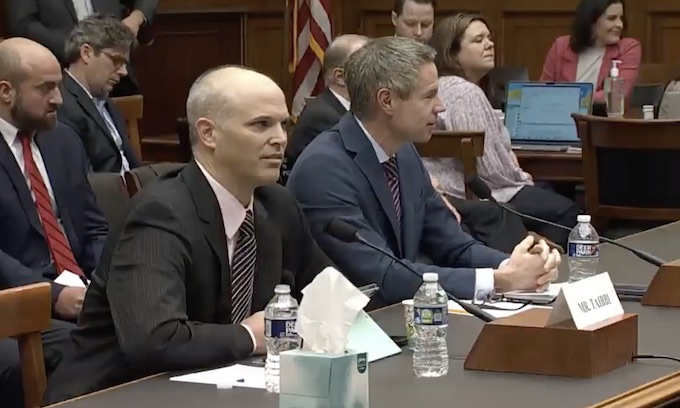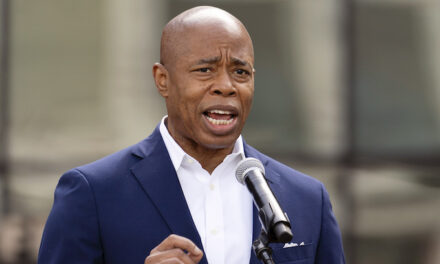Rep. Jim Jordan (R-Ohio) on Monday demanded answers from the Internal Revenue Service (IRS) about why an IRS agent allegedly made an in-person visit to the New Jersey home of investigative journalist Matt Taibbi, with Jordan suggesting possible witness intimidation.
Jordan penned a letter to IRS Commissioner Daniel Werfel and Treasury Secretary Janet Yellen, in which the House Judiciary Committee Chairman requested all documents and communications relating to the IRS’s alleged field visit to Taibbi’s New Jersey home on March 9, the same day the journalist appeared before Congress to testify on government abuse.
“In light of the hostile reaction to Mr. Taibbi’s reporting among left-wing activists, and the IRS’s history as a tool of government abuse, the IRS’s action could be interpreted as an attempt to intimidate a witness before Congress,” Jordan wrote in the letter, which was obtained by The Epoch Times.
‘Incredible’ Circumstances Around IRS Visit
Taibbi, who was one of the journalists who was given access to internal Twitter communications as part of the “Twitter Files” reporting, appeared on March 9 before the Select Subcommittee on the Weaponization of the Federal Government, which Jordan also chairs.
At the hearing, Taibbi discussed evidence that the federal government had pressured tech companies to censor content. Taibbi’s reporting on the “Twitter Files,” to which he was granted access by Elon Musk, referenced correspondence between federal officials and social media executives that included requests to remove content from platforms.
While Taibbi was testifying before Congress, an IRS agent visited his private residence in New Jersey and left a note asking Taibbi to contact the tax agency, according to Jordan’s letter.
“The circumstances surrounding the IRS’s unannounced and unprompted visit to Mr. Taibbi’s home, at the exact time that he was testifying to Congress about ‘the most serious’ government abuse he has witnessed in his career as a journalist, are incredible,” Jordan wrote.
Jordan said in the letter that the IRS indicated it had rejected Taibbi’s 2018 and 2021 tax filings over concerns of possible identity theft.
What’s troubling, according to Jordan, is that the visit came on the same day Taibbi was testifying before Congress and over four years after Taibbi’s accountant was notified by the IRS that it had accepted his 2018 tax filing and, since then, had never notified Taibbi nor his accountant of any problems.
“The IRS’s visit is all the more concerning in light of Mr. Taibbi’s assertions that the IRS informed him the problems were not ‘monetary’ and he had never received any prior indication of any issues with his 2018 return.”
“These facts demand a careful examination by the Committee to determine whether the visit was a thinly-veiled attempt to influence or intimidate a witness before Congress,” Jordan wrote.
Taibbi, for his part, took to Twitter to say that he’s deferring comment on the matter until the IRS replies to Jordan’s demands.
“For those asking, I don’t want to comment on the IRS issue pending an answer to chairman @Jim_Jordan’s letter. I’m not worried for myself, but I did feel the Committee should be aware of the situation.” Taibbi said.
Michael Shellenberger, an investigative journalist who joined Taibbi in testifying before Congress on March 9 on government abuse, remarked that the IRS agent’s visit to Taibbi’s home was highly unusual.
“While @mtaibbi & I were testifying before Congress on the weaponization of the federal government, an IRS agent showed up at his house. What an amazing coincidence,” Shellenberger wrote.
“That’s very odd,” Musk commented on Shellenberger’s Twitter post.
After buying Twitter in October, Musk gave Taibbi and Shellenberger access to internal company communications that led to explosive disclosures that some analysts say show evidence of collusion between former Twitter managers, the federal government, and left-wing organizations.
The Weaponization Select Committee was established in January to probe alleged collusion between Big Tech and government.
Twitter Files Revelations
Commenting on the Twitter Files disclosures in December, Musk expressed the view that nearly every conspiracy theory people held about Twitter ended up being accurate.
“To be totally frank, almost every conspiracy theory that people had about Twitter turned out to be true,” Musk said during a Dec. 24 interview on the “All-In” podcast.
“Is there a conspiracy theory about Twitter that didn’t turn out to be true? So far, they’ve all turned out to be true. If not more true than people thought,” he added.
Asked if there’s any part of the Twitter Files that he found especially shocking, Musk replied that the “FBI stuff is pretty intense.”
Musk’s remarks came on the heels of an installment of Twitter Files that Shellenberger said pointed to collaboration between federal agencies and social media companies to suppress a New York Post story about Hunter Biden’s laptop.
“In Twitter Files #7, we present evidence pointing to an organized effort by representatives of the intelligence community (IC), aimed at senior executives at news and social media companies, to discredit leaked information about Hunter Biden before and after it was published,” Shellenberger wrote.
Shellenberger released screenshots that appeared to be of messages between top Twitter officials and the FBI in October 2020.
Hours after the New York Post ran its bombshell story about the Hunter Biden laptop, Twitter and Facebook moved to limit its reach, going so far as to block Twitter users from sharing or direct messaging the story.
The FBI has denied any wrongdoing in an earlier comment to The Epoch Times.



















“Oh, that’s easy, Mr Jordan—because we can and we felt like it.”
I’d not believe them even if they TOLD the truth.
“Jim Jordan Presses IRS To Explain Unannounced Visit To Twitter Files Journalist Matt Taibbi’s Home”. Jim, I can explain it. The IRS is a corrupt communist / liberal organization and that is why they showed up at Matt’s house.
THEY ARe one org i’d love to see get DEFUNDED>
My my my. In 2008 I sent a letter to my representative about the irs not sending my refund in a timely manner. She sent me a form to fill out. 145 days later I received my refund. 6 months later the it’s hit my bank account for a large sum stating the I owed back taxes. No lawyer wouldd take the case even though I had proof that my taxes were paid. That same year I lost my caree I’m now a racist thief in the eyes of CA government. Nobody believed me that I was screwed over by the leftist movement. Not any more. The truth is in the pudding.